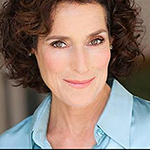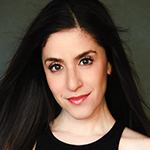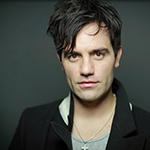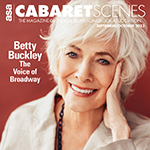A Conversation with Yael Rasooly
May 20, 2018
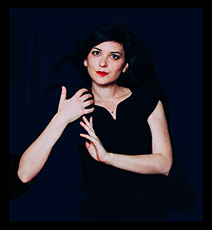
Yael Rasooly is an international theater artist from Israel who will be performing two cabaret shows in June at two different clubs in New York City. She has presented her interdisciplinary theater pieces in over 25 countries around the world. Her show Paper Cut, described by The New York Times as “inspired wackiness,” won the Excellence Award at the New York Fringe Festival in 2011. Next spring semester, Yael will be a guest professor at Trinity College in Connecticut, teaching independent theater-makers. You can catch her at the Laurie Beechman Theatre on June 5th at 7pm, and at The Duplex on June 30th at 7pm, in a collaboration with accordionist, arranger, and composer Iliya Magalnyk. Their program consists of music by, among others, Charles Dumont, Edith Piaf, and Shalom Secunda.
Cabaret Scenes: Which came first for you? Concert (singing) performance, or theater?
Yael Rasooly: The music came first. I started studying classical piano and then singing from a very young age. I actually started performing at the age of six in concerts and competitions, and touring abroad with a famous children’s choir from the age of 10. It was a very ambitious upbringing, oriented on excellence and intense training, and it was very competitive.
Theater and directing came later. Through it I realized the potential of a personal form of expression and liberty. And through the theater I also returned to music in a new way, based on what I had learned through the intense classical training, but reclaiming it as my own.
CS: How do you choose your material?
YR: I am always drawn to songs that tell a story and that tell and expose an inner truth. This if for sure why the repertoire of Edith Piaf is for me an endless source of discovery and inspiration. When turning to these classics, from another time and another culture, it’s all about how it resonates in me. The more I am specific in myself—in the moment, the memory, what each word paints for me—the further it can echo in the person listening.
I think about the journey, the landscape of emotion I want our audiences to experience, throughout a single song and in the length of the performance. Contrasts and contradictions are always something I search for, between melody and words, between what is apparent and what is there under the surface. And, of course, I sometimes just fall in love with a song—its energy, humor, the challenge in its delivery, and range of colors it allows me to be between fragile and powerful, naive and brutally sober, masked and exposed. I choose material in different languages, whether I speak them or not. It’s a way of discovering a culture, connecting to people through their own language, and a kind of juggling and challenge I seem to adore.
CS: What draws you to the accordion as accompaniment?
YR: The accordion has always seemed to me an instrument for storytelling. There is also, of course, the accordion’s distinguished part in French music and chansons which has been my focus for a very long time and an important part of my musical world. In the hands of the right musician the accordion transcends to a full orchestral presence. And, in the next moment, it can transform and be as intimate as a music box.
I must say I did not always have such a passion for the accordion—that changed when I met Iliya Magalnyk. When I heard him playing for the first time I think I broke a record in holding my breath. I was just stunned by such immense virtuosity that meets something beyond grasp or definition, that comes with a great soul. He is a musician and an artist on the grandest scale, and I am so privileged to be creating and performing with him. There is that moment in the shows every time, when I can sense the audience going through what I myself experienced upon hearing him, that sense of utter wonderment.
Besides being a brilliant musician, Iliya is also an arranger and composer.
With every song we work on, especially if it is a classic, we search together how to make it our own, and in his arrangements he can move so freely and accurately between classical music, jazz, swing, tango, klezmer, etc. Having worked with so many musicians in my life, I know how rare it is to find such a connection. I truly can’t wait to share this with our audiences in NYC.
CS: Who is your favorite performer of all time?
YR: Edith Piaf. Though, in the same breath, I would have to say Nina Simone. Both continue to inspire and amaze me time and time again, and have had a vast influence on me and my path.
CS: Do you see a big difference in audiences in your theater work in the U.S. as opposed to Europe or Israel (demographics and reaction)?
YR: Audiences are always different: Between big cities and rural areas, between countries and cultures, whether you play in the winter or summer, small or massive venue. Audience dynamics fascinate me, especially as I am almost always in contact with them throughout the shows. Sometimes it’s enough to have someone with a boring laugh for the whole energy in the audience to change and the entire rapport between them and the performer, too. So I tend not to generalize by country of origin.
However, when it comes to American audiences—there is a however!—I always sense a grand receptiveness, a kind of generosity and openness that allows me to fly higher in my performance and our encounter. My performances in the U.S. are always highly memorable experiences that charge me with energy and stay close to my heart.
CS: What is your plan for conquering (theatrically speaking) the U.S.?
YR: I absolutely l-o-v-e performing my solo show Paper Cut for American audiences. It’s been 7 years since I first played it in the U.S., at the New York Fringe Festival where the show won the award for best solo performance, and since, I have performed it in over 25 countries around the world. Now I want to bring the show back to New York for a long-term run and for continued tours in the U.S. It is such a special pleasure to perform the show for an audience that picks up on all the cinematic and musical quotes and references, between Hollywood glamour era and the films of Hitchcock. But it’s also beyond that. Whenever I tour Paper Cut in the U.S., I feel in a strange and exciting way like I’m bringing the show home.
Besides that, I have a few other visual-musical theater creations up my sleeve that I wish to produce in the U.S., on Broadway and off-Broadway, that I believe will make some heads and hearts turn. The sky is the limit!
Next spring semester I am invited to be a guest professor at Trinity College in Connecticut, where I will be teaching a few courses in directing and creation for the independent theater-maker. This is a fantastic opportunity to share my knowledge of my field and path, and all the influences from working in contemporary visual theater in Europe and to support and guide a new generation of emerging artists that I wish to encourage in finding their own voices.
As for the music and singing, I hope to meet and collaborate with some fantastic musicians in the U.S., some of whom I know already and others I have yet to meet…!


